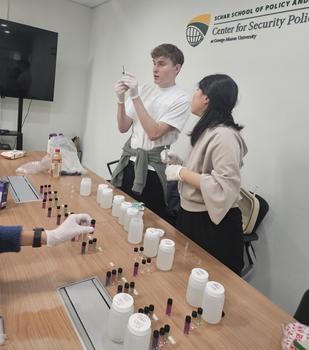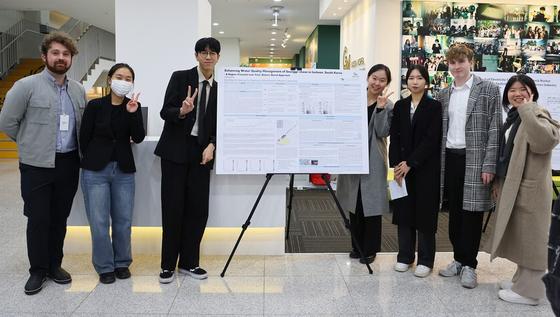An undergraduate student-led Mason Impact project at Mason Korea results in a co-authored article published in the peer-reviewed international journal Environmental Monitoring and Assessment. “Accessible water quality monitoring through hybrid human–machine colorimetric methods” stems from the Mason Impact project focused on environmental conditions in the Seunggi-cheon stream in Incheon.
Under the mentorship of Soyoung Kwon, associate dean of external affairs and professor of global affairs, and Dakota McCarty, an assistant professor in the Department of Environmental Science and Policy, Mason Korea students collected and analyzed water samples, tested an innovative low-cost method for monitoring water quality, and contributed new insights to the field. Their approach combined colorimetric testing with human-guided digital analysis, producing data that closely aligned with laboratory results.

The project gave students valuable, hands-on experience in all stages of academic research—from fieldwork and data analysis to writing and publication. It introduced them to the world of scientific inquiry and academic publishing, equipping them with the skills, confidence, and credentials to pursue future research and graduate study.
“Working with Dr. McCarty and the other Center for Security Policy Studies (CSPS) Fellows gave me new insight into environmental security concerns like access to clean drinking water,” said Sam Sims, a junior global affairs major. “Now it’s an important part of how I think about security as a whole.”
CSPS, founded by director Ellen Laipson, is a unit of the Schar School of Policy and Government.
“[This paper] highlights the power of collaborative inquiry and the real social impact of student research,” Kwon said. “Mentoring these emerging scholars was incredibly rewarding, and I hope it inspires future student-led projects.”
McCarty agreed. “I’m incredibly proud of the students. Moving from a local project to a peer-reviewed international publication is a rare achievement at the undergraduate level,” he said. “It not only gives students a glimpse into real research but also strengthens their academic profiles for graduate school and beyond.”

